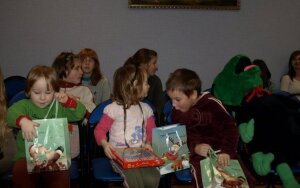- March 20, 2013
- 521
Samsel: Donors

I considered for a long time whether to write this text. Because the case is extraordinarily sensitive. The issue concerns an aid in kind to Poles living in Lithuania. For several years me and my wife have been collecting books, clothes, toys and other things with which we support various places in Vilnius Region. Of course, as far as it is possible, we also add something.
It happens that we gather a good deal which our car carries towards Lithuania with a grace of gravid sow. We would like to warmly thank those of you who support our activity. There is, however, one issue which causes difficulties and confusion. Unfortunately, quite often I just have to throw away many of the donated items. Formerly I did it on arrival. In Lithuania. Now I do it even in Warsaw in order not to carry… well… sometimes simply rubbish.
It used to happen that I had to burn books presented for Polish schools. But what was I supposed to do if a book titled “The History of Poland” was published in 1976 (as far as I remember)? I read an excerpt about Katyn and decided that only a furnace is an appropriate place for it. Once I got agricultural machinery form Poland in the form of rusty, bent ploughs without mounting bolts. I have thrown away quite a lot of clothes and toys. Yes, it’s true that in general people lead more austere lives in Lithuania than in Poland. Especially when it comes to compare Warsaw with the villages near Nemenčinė or Eišiškės.
It is also true that there are education establishments which owns embarrassingly modest cluster of Polish literature. However, is it really necessary to supplement it with “Orzeszkowa” that is crumbling in hands? I think it is not. Particularly if we take into account that Polish children living in Lithuania have to compete with their Lithuanian peers. So how could they compete if others have colourful textbooks smelling of newness and we offer them volumes dug out from the bottom of our basement? Besides, this is a contribution to the general level of Polish schools. In my opinion, we can be confident about their future in Lithuania not until their level is significantly higher than the one of other schools. This should be our purpose. And this involves expenditure. I am sorry to say that there are some people in Poland who use the opportunity of such “help” to do a clean-up.
They do not throw away unnecessary and completely worn out things into the place where they belong—i.e. a dustbin. They pass them on to other people and they even expect thankfulness. I guess that such an attitude is triggered by a stereotype with which I sometimes encounter. And so on the password: Poles in the east, there open up the images of wooden ruined shacks. A bunch of grimy kids clad in linen threadbare shirts etc. In brief, Chełmoński and his paintings of countryside. The image, of course, is no longer true but still lingers on in the consciousness of some of my countrymen. That’s why they assume that if they donate bedclothes under which they are ashamed to sleep (once I had such an instance) then they are very helpful. Sometimes I am greeted with: “So You gather things for children in Ukraine. I have some clothes which my daughter has outgrown. Do You want them?” But the daughter is probably 30 years old now because the clothes look as though they were from 80s. I have really no idea what to answer in the situations like this one. Because I don’t want to discourage people and I believe in their sincere intentions. After all, these are really positive features. On the other hand, I don’t actually need it. I would feel really ashamed to hand such items over because it would be a real disgrace on my part and the humiliation on the recipients’.
To the extent possible, I try to show a liberal attitude. And I always inform the recipients that if they decide not to use something then they shouldn’t hesitate to throw it away. I would take no offence. I hope that this writing will prompt some people to reflect. Since I know that not only me and my wife try to help in this simple way. I also know that this sort of problems other people have to face as well. To the majority (roughly two thirds of the donors) who doesn’t provide us with such dilemmas, once again, in the name of the fellow countrymen from Vilnius Region, I would like to say thank you. Of course I encourage other people to offer their help which I believe makes sense. Ultimately, who would lend a helping hand to us—Poles—if not we ourselves to one another, mutually?
Source: http://pl.delfi.lt/opinie/opinie/samsel-darczyncy.d?id=60945153
Tłumaczenie Hanna Hołub w ramach praktyk w Europejskiej Fundacji Praw Człowieka, www.efhr.eu. Translated by Hanna Hołub within the framework of a traineeship programme of the European Foundation of Human Rights, www.efhr.eu.

